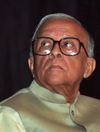
The Communist Party of India (Marxist) (abbreviated as CPI(M)) is a communist political party in India. It is the largest communist party in India in terms of membership and electoral seats, and one of the national parties of India. The party was founded through a splitting from the Communist Party of India in 1964 and it quickly became the dominant fraction.

Jyoti Basu was an Indian Marxist theorist, communist activist, and politician. He was one of the most prominent leaders of Communist movement in India. He served as the 6th and longest serving Chief Minister of West Bengal from 1977 to 2000. He was one of the founding members of the Communist Party of India (Marxist). He was the member of Politburo of the party since its formation in 1964 till 2008. He was also the member of West Bengal Legislative Assembly 11 times. In his political career, spanning over seven decades, he was noted to have been the India's longest serving chief minister in an elected democracy, at the time of his resignation. He was proposed for the post of Prime Minister of India for four times.
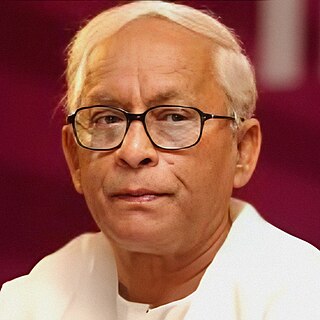
Buddhadeb Bhattacharjee is an Indian communist politician and a former member of the Politburo of the Communist Party of India (Marxist), who served as the 7th Chief Minister of West Bengal from 2000 to 2011. In a political career over 5 decades, he became one of the senior leaders of Communist Party of India (Marxist) during his regime.
Politics in West Bengal is dominated by the following major political parties: the All India Trinamool Congress, the Communist Party of India (Marxist), the Bharatiya Janata Party, and the Indian National Congress. For many decades, the state underwent gruesome and terrible political violence. Since the 2011 West Bengal Legislative Assembly election, it has been governed by the Trinamool Congress party. Previously, it was ruled by Left Front led by the Communist Party of India (Marxist) for over three decades.
Mohammed Amin was an Indian politician from the Communist Party of India (Marxist), the largest communist party in India. He was a Vice President of the Centre of Indian Trade Unions.

The history of West Bengal began in 1947, when the Hindu-dominated western part of British Bengal Province became the Indian state of West Bengal.
Ashok Bhattacharya is an Indian politician and the former mayor of Siliguri Municipal Corporation. He is a member of Communist Party of India (Marxist). He is a prominent leader of CPI(M) in the northern region of West Bengal. He was the Minister of Urban Development and Municipal Affairs in the Government of West Bengal for three consecutive terms (1996–2011).
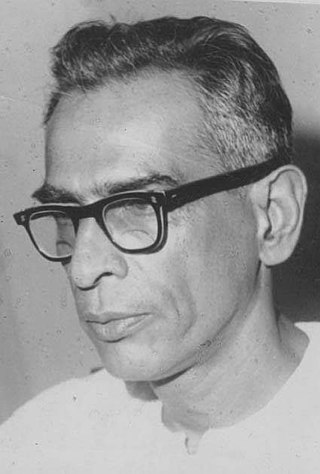
Hare Krishna Konar was an Indian Marxist revolutionary, political theorist, charismatic peasant leader and politician. Konar was a founding member of the Communist Party of India (Marxist), the figurehead behind India's first land reform, and the chief architect of the West Bengal land distribution. Between the 1960s and 1970s, he became one of the principal leaders of the Communist movements in India. In 1932, due to his involvement in the Begut Robbery Case of the Jugantar Party, Konar was deported to the Cellular Jail of the Andaman for 6 years at the age of 18, there he took part in the first hunger strike and in 1935 he founded the Communist Consolidation and led the historical second hunger strike.
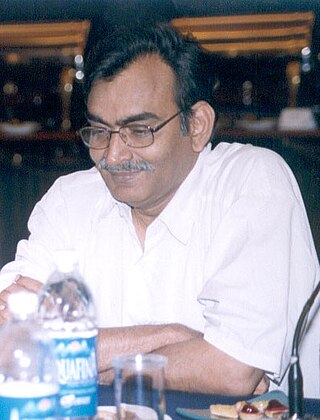
Surjya Kanta Mishra is an Indian politician, belonging to the Communist Party of India (Marxist). He served as Minister of Health and Minister in-charge of Land & Land Reforms, Panchayats & Rural Development in the Left Front governments of West Bengal and was the Secretary of the Communist Party of India (Marxist), West Bengal State Committee between 2015 and 2022.

The Left Front is an alliance of left-wing political parties in the Indian state of West Bengal. It was formed in January 1977, the founding parties being the Communist Party of India (Marxist), All India Forward Bloc, the Revolutionary Socialist Party, the Marxist Forward Bloc, the Revolutionary Communist Party of India and the Biplobi Bangla Congress. Other parties joined in later years, most notably the Communist Party of India.

Legislative Assembly elections was held in the Indian state of West Bengal on 14 June 1977. The polls took place after the ousting of Indira Gandhi's government at the Centre. The Left Front won a landslide victory. The 1977 election marked the beginning of the 34-year Left Front rule in West Bengal, with Communist Party of India (Marxist) leader Jyoti Basu leading the first Left Front cabinet. The election finally put to rest, the decade-long political instability that had begun since 1967.

Legislative Assembly elections were held in the Indian state of West Bengal in 1982. The Left Front, which had won the 1977 West Bengal Legislative Assembly election, emerged victoriously. The Indian National Congress emerged as the main opposition party in the state, as the Janata Party was disintegrating.

Legislative Assembly elections were held in the Indian state of West Bengal in 1991. The election took place simultaneously with the 1991 Indian general election. The term of the assembly elected in 1987 lasted until February 1992, but the West Bengal government asked the Election Commission of India to arrange the election at an earlier date.
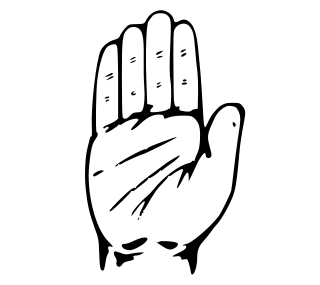
Legislative Assembly elections were held in the Indian state of West Bengal in 1996. The election took place simultaneously with the 1996 Indian general election. This was the last election Jyoti Basu contested, as he retired from politics in 2000.

Legislative Assembly elections were held in the Indian state of West Bengal in 1971. The assembly election was held alongside the 1971 Indian general election.

Elections were held in Indian state of West Bengal in February 1969 to elect 280 members to the West Bengal Legislative Assembly. United Front formed the government with Ajoy Mukherjee as the Chief Minister. United Front won a landslide 214 seats and 49.7% of the votes.

In 1964, a major split occurred in the Communist Party of India. The split was the culmination of decades of tensions and factional infighting. When India became independent in 1947, differences arose of how to adapt to the new situation. As relations between the Nehru government and the Soviet Union improved, a faction that sought cooperation with the dominant Indian National Congress emerged within CPI. This tendency was led by S.A. Dange, whose role in the party hierarchy became increasingly controversial. When the Sino-Indian War broke out in 1962 Dange's opponents within CPI were jailed, but when they were released they sought to challenge his leadership. In 1964 the party was finally divided into two, with the left faction forming the Communist Party of India (Marxist). The split had a lot of regional variations. It also impacted other organizations, such as trade union and peasant movements. The split has been studied extensively by scholars, who have sought to analyze the various domestic and international factors involved.

Shantaram Savlaram Mirajkar was an Indian communist politician and trade unionist. He was part of the old guard of the Communist Party of India, led the All India Trade Union Congress as its president for many years and served as mayor of Bombay.
The 34 years of Left Front led Government in West Bengal during 1977-2011 refers to the consequently winning of the Communist Party of India (Marxist)-led Left Front in the West Bengal Legislative Assembly elections and democratically forming Government for seven terms starting from 1977 to 2011 in the Indian state of West Bengal. This period (1977–2011) is the longest serving of any democratically elected communists-led Government in the world. The "34 years of Left Front rule in West Bengal" is a well used political term coined by politicians in the West Bengal politics as well as politics of India.












